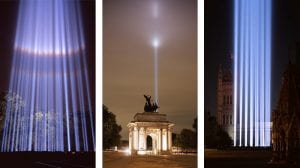
Kevin Hayes, First Year BA (Hons) Visual Culture student anticipates a visit to see the work of artist Ryoji Ikeda showing at 180 Studios, London.
When lockdown properly ends, one of the things I am most looking forward to is the Ryoji Ikeda exhibition at 180 Studios in London. Ikeda is a Japanese composer and conceptual artist who creates immersive light and video installations and soundscapes, many of which seem, to me, to be in part, a response to the difficulties of comprehension caused by the data-driven nature of 21st-century life.Ikeda is probably best known to British audiences for his piece, spectra. Presented as part of the WWI centenary commemorations, it was a column of light, created by 49 searchlights by the Houses of Parliament, which dominated the London night skyline for a week in August 2014. Visible from over 12 miles away, it appeared almost like an illuminated pillar, but up close, the movement of moths and insects attracted to the lights meant that the individual beams seemed to be alive and moving. As Ikeda said, ‘When you experience it, any kind of context is suddenly gone. From a distance, it looks monumental and solid, but when you are in it, it is entirely meditative.’
His new London exhibition will showcase 12 works, including spectra III, which I originally experienced at the 2019 Venice Biennale. spectra III could be viewed as the epitome of “but-is-it-art” minimalism, as it’s “just” an empty corridor, with semi-reflective white walls lit by fluorescent lamps. However, as you proceed through the space the work reveals itself. The combination of the reflective surfaces and harsh lighting produce a dizzying, disorientating effect that becomes more intense the further you go. By the time I reached the middle, I felt utterly dazzled, which is, of course, the point. This is a piece that leaves the visitor momentarily blinded, with pure bright white light achieving the effect we would typically associate with pitch-black darkness.

Ryoji Ikeda, spectra III (2019). Installation photo courtesy of La Biennale Di Venezia, The Artist and Audemars Puget © Ryoji Ikeda Studio
Something I have enjoyed about my degree so far has been the sense of “joining the dots” between art I’ve already seen and academic theory. Recently I was introduced to Georg Simmel’s writings about the alienation caused by the overwhelming stimuli of urban life, which reminded me of Ryoji Ikeda’s work (Simmel, The Metropolis and Mental Life, 1903).
In Venice, spectra III was shown alongside Ikeda’s video installation data-verse 1, which visualises scientific information from sources such as CERN and NASA. Both pieces appear to respond to the overwhelming “noise” of our constantly “switched on” modern existence but in opposite ways: data-verse 1 tries to make sense of the flood of information by converting it into imagery, whereas spectra III overloads our senses.
Both pieces will be in the London exhibition, and I’m really looking forward to seeing them again, this time with some more academic context.
RYOJI IKEDA is at 180 Studios, 180 The Strand, London, WC2R 1EA from 20th May to 1st August 2021. www.180thestrand.com

Thank you Kevin Hayes for making accessible an appreciation of an art form often consigned to subjective interpretation, which for most observers means less about unraveling any deeper subtleties than making a roughly coherent comment. If more professional critics wrote humbly about profound experience than deployed the conventional, snidely reverential, perhaps works by artists like Ryoji Ikeda would get the audiences the same critics clearly feel it is their life’s purpose to scare off. Well done Kevin.
Thank you, Ray Wells. I will pass your comment on to Kevin Hayes. Best wishes, Megha Rajguru, History of Art and Design Tutor.